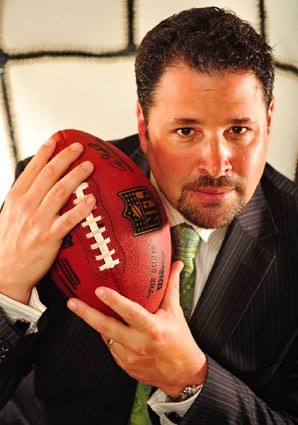I considered titling this column, “Agent Pays College Player!,” but decided such an obvious headline might dissuade news-hungry surfers. Surely the relative lightning strike of a canine feasting on human flesh would grab some attention.
Sports Illustrated devoted its October 18th issue to the “confessions” of a former sports agent by the name of Josh Luchs. The editors devoted the cover to a single quote from Luchs: “I will never forget the first time I paid a player … ” All-type magazine covers aim at drawing attention to the heaviest of issues. Say, for instance, a debate on the existence of God. This cover carries about as much weight as a Keith Richards memoir on the first time he took a sip of Jack.

As obvious as the “confessions,” may be (the story is written in first person, as told to SI’s George Dohrmann), the details make for a compelling read, however dirty your fingers may feel as you turn the pages. A few sample quotes on how prevalent — and how easy — money has become in the world of college athletes:
• “I saw how magical those athletes were, how people responded to them, and knew I wanted to be associated with athletes in the future.”
• “I filled out the paperwork required by the [NFL Players Association], just a few forms, and paid about $300.”
• “I had to give smaller amounts each month so the player would stay in regular touch.”
• “Most of the time the player or someone from his family approaches us.”
• “It’s no secret in the agent business that some college coaches steer players to certain agents.”
None of those items should shock a college sports fan out of his or her seat. But every one of those items should make that fan reconsider what the NCAA truly is, and the legitimacy of any achievement, from a collection of SportsCenter highlights to a national championship. Particularly in the sports of football and basketball, the NCAA is nothing less than a feeder system — a minor league — for the professional entities that earn billions on what the NCAA feeds them. Obvious? Sure, as obvious as the quote on this magazine cover.
I’ve written on this subject before, and my stance hasn’t changed: the only cure for the illicit paying of big-time college athletes is to formally legitimize the partnerships between the NFL, NBA, and NCAA. Not unlike the Great Marijuana Debate, this is an issue that demands honesty, and the long-overdue admission that more can be gained from opening a dirty closet than by keeping it sealed behind a quaint definition of “amateur.”
Sadly, the condition is worsening. In 1999, the NFLPA actually changed a rule that required athletes found to have taken money from agents in college to pay that agent back. With no repercussions for taking the money and running, what incentive does a college athlete have for loyalty, even when the relationship is out of bounds by NCAA standards? A sanctioning body that might be able to define some margins for the practice of paying amateurs has actually created an open field for competition among agents who already know they’re breaking NCAA rules.
Memphis is a big college town. Just ask the 18,000 people who filled FedExForum last Friday night to see their favorite college hoops team practice. (You gotta wonder where they were Saturday, though, when fewer than 19,000 showed up to see the same school’s football team play its oldest rival — in a real game — on a cloudless Saturday.) Any publicity given to the maneuvering of agents around college prospects should be considered by a fan base ready to cheer Will Barton, Wesley Witherspoon, and Joe Jackson toward the Final Four. Not that any of those three players has taken a red cent to play for the U of M. But each of those players could well sign a seven-figure NBA contract in the next two years. Why wouldn’t an agent know where they live? How their family is managing financially? When they’ll be turning pro? It’s capitalism . . . the commodity just happens to be human.
One more quote, this one from a former USC receiver named R. Jay Soward (ever hear of him? I hadn’t), who took money from Luchs during his days as a Trojan: “I would do it again. I have four sons, and if somebody offered my son money in college and it meant he didn’t have to be hungry, I would tell him to take it.”